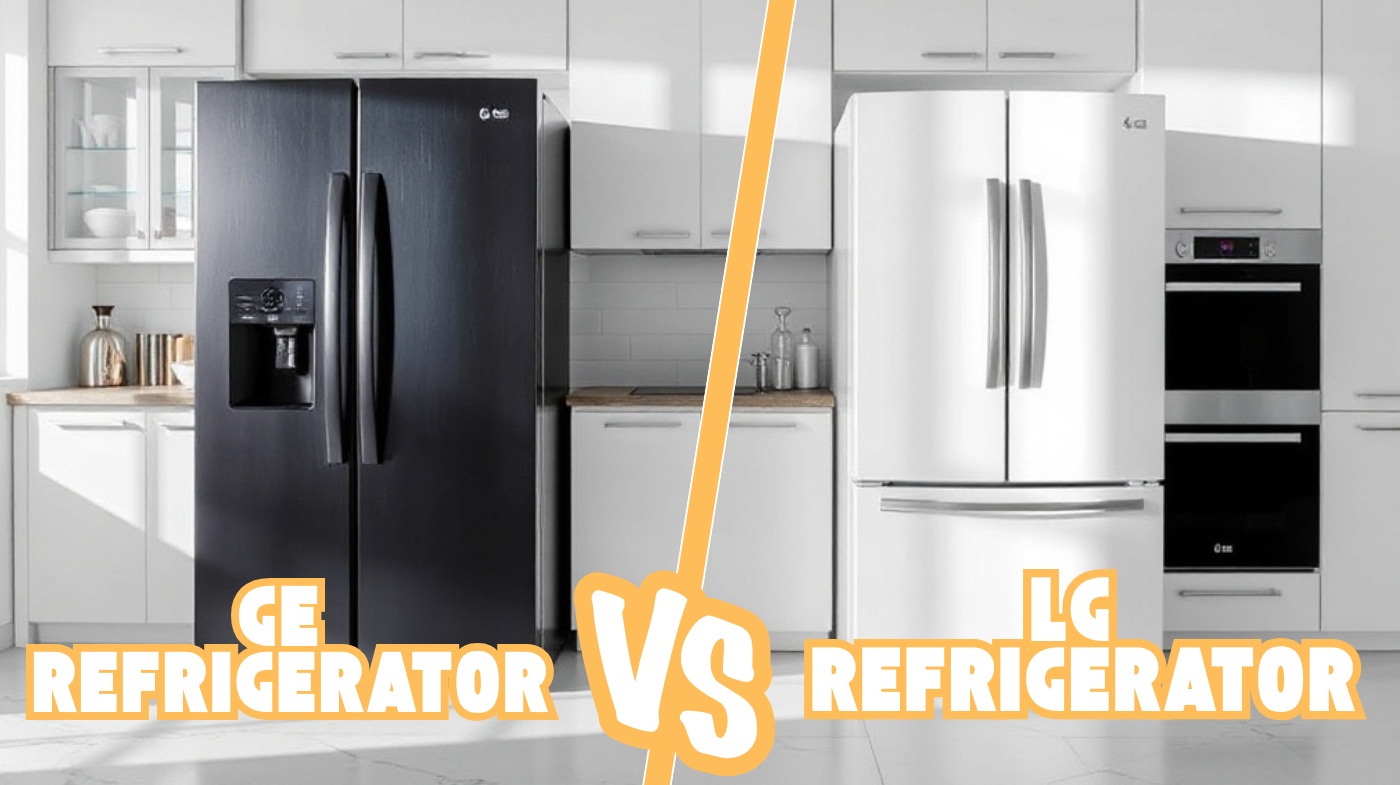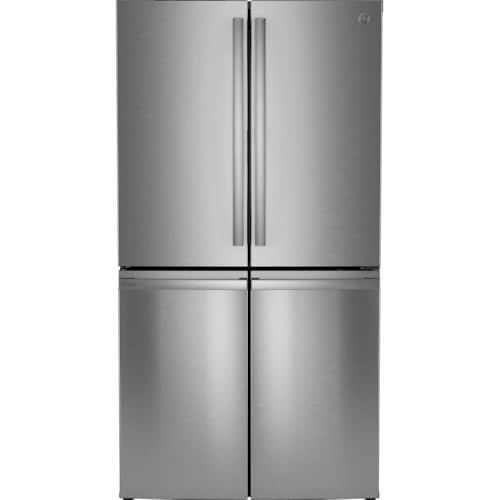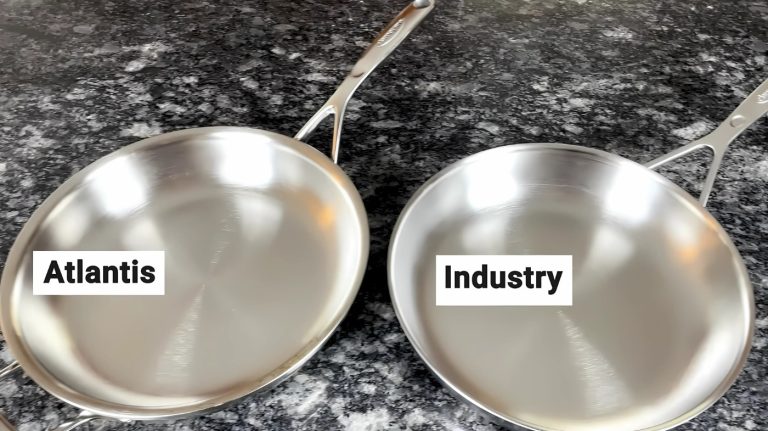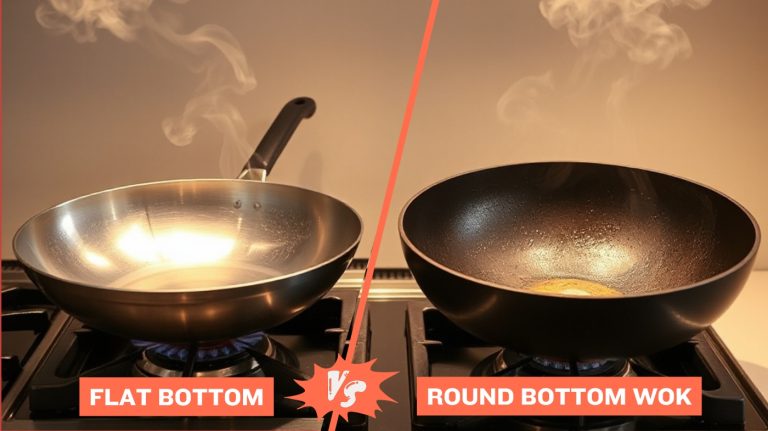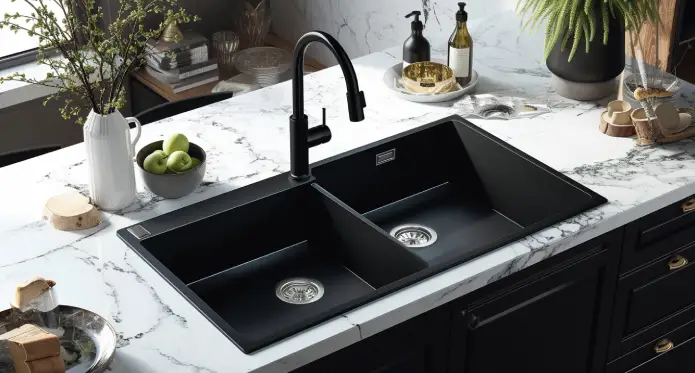GE Refrigerator vs LG: Key Differences You Need to Know
If you want energy efficiency with sleek smart features, LG refrigerators stand out, featuring advanced cooling and a quieter compressor.
However, GE shines in reliability, offering longer lifespans, easier repairs, and practical designs at a lower price point.
GE’s straightforward technology makes it a strong choice for those prioritizing dependability and budget, while LG excels with cutting-edge innovation and sleek design. Comparing these factors will help you pinpoint the best fit for your needs.
- Large 27.9 Cu. Ft. Capacity – Spacious interior with flexible storage, ideal for families and…
- External Water & Ice Dispenser – Provides cold filtered water plus cubed and crushed ice…
- Depth With Door Open (Maximum 48.38 in.) – Designed for standard kitchen layouts while allowing…
- Sleek, Minimalist Design
- Access Fresh Filtered Water
- Keeps Produce Fresh Up To 2x Longer
Key Takeaways
- LG refrigerators offer higher energy efficiency and smart cooling features, while GE emphasizes reliable performance and longer lifespan.
- GE models generally have lower starting prices and simpler repairs, appealing to budget-conscious buyers seeking dependability.
- LG excels in advanced smart controls and sleek designs, including InstaView panels and Craft Ice makers.
- GE refrigerators typically run quieter and offer extended sealed system coverage along with strong repair support.
- Consumer satisfaction favors LG for modern features and quiet operation, while GE is preferred for durable reliability and customer service.
GE Refrigerator vs LG: Key Comparison Table
| Feature | GE Refrigerators | LG Refrigerators |
|---|---|---|
| Energy Efficiency | consistent performance, reliable efficiency | consistent performance, Inverter Linear Compressor |
| Reliability & Longevity | Longer lifespan, fewer repairs needed | Newer technology, more service calls |
| Cooling Technology | TwinChill evaporators, Turbo Cool Boost | Smart Cooling Plus, humidity control |
| Noise Level | Under 45 decibels, quieter operation | 44-48 decibels, some high-pitched sounds |
| Smart Features | SmartHQ app, practical controls | ThinQ app, voice assistant integration |
| Design | Classic/contemporary styles, practical features | Sleek modern design, InstaView panels |
| Repair & Service | Easier repairs, extensive service network | Complex repairs, limited support |
| Food Preservation | Odor isolation, rapid cooling modes | Adaptive humidity control, uniform conditions |
| Smart Home Integration | Basic connectivity, appliance-specific | Broader compatibility, Alexa/Google Assistant |
Energy Efficiency Comparison
When comparing energy efficiency, LG refrigerators generally outpace GE models by a small margin, thanks to advanced technologies like the Inverter Linear Compressor that adjusts cooling power to actual needs.
Both brands offer ENERGY STAR-certified options; however, LG has received the ENERGY STAR Partner of the Year—Sustained Excellence award eleven times since 2012, reflecting ongoing innovation. LG refrigerators also tend to have higher energy efficiency ratings compared to their GE counterparts.
GE, on the other hand, has sold over 9 million ENERGY STAR refrigerators, emphasizing reliable efficiency at scale.
LG’s compressor technology and smart systems drive better energy savings, especially in compact and large models, whereas GE focuses on consistent performance with features like Turbo Cool Boost.
Your choice depends on whether you prioritize peak efficiency or proven reliability.
Cooling Technology and Food Preservation
Beyond energy efficiency, cooling technology plays a significant role in how well a refrigerator preserves your food.
LG’s Smart Cooling Plus adapts to humidity and temperature changes, maintaining uniform conditions and minimizing spoilage risk. Its inverter linear compressor precisely modulates cooling, while humidity-controlled crispers enhance produce freshness. LG’s refrigerators are known for being Energy Star-certified, emphasizing energy efficiency.
GE’s TwinChill evaporators independently cool the fridge and freezer, preventing odor transfer and preserving flavors. Turbo Cool Boost and TurboFreeze modes quickly restore temperatures after door openings or adding warm items, enhancing freshness in both brands.
GE’s advanced air filtration further protects food quality. Both use multi-airflow systems and smartphone controls for precise temperature management.
Choosing between them depends on whether you prioritize LG’s adaptive humidity control or GE’s odor isolation and rapid cooling features for superior food preservation.
Reliability and Longevity Analysis
Although both GE and LG offer advanced refrigeration technologies, GE consistently earns higher marks for reliability and longevity.
You’ll find GE refrigerators require fewer repairs and last longer, thanks to well-stocked parts and robust components. LG’s newer compressor technology improves efficiency but hasn’t yet matched GE’s durability, leading to more frequent service calls and higher repair costs.
Additionally, GE covers labor costs for refrigerators over 6.6 cubic feet, which adds value to long-term ownership and repairs.
GE’s extensive service network also makes maintenance easier, reducing downtime.
GE’s broad service network simplifies maintenance and minimizes appliance downtime for a hassle-free experience.
Key points to reflect on:
- GE exhibits longer operational lifespans with fewer compressor failures; LG’s longevity is improving but still trails.
- GE offers longer operational lifespans with fewer compressor issues, while LG continues to improve in overall longevity.
- Consumer satisfaction and industry studies consistently rank GE higher for dependability and fewer breakdowns.
Choosing GE means investing in proven reliability and sustained performance over time.
Design and User Experience Features
Anyone looking for a modern refrigerator will find that both GE and LG offer French-door models with comparable sizes and build quality, but their design philosophies diverge in notable ways.
LG leans toward sleek, high-tech designs featuring Smart Pull® handles and the InstaView glass panel, letting you see inside without opening the door. They also provide options like the PrintProof™ finish, which helps keep the exterior looking clean and smudge-free.
GE offers versatile styles to fit classic or contemporary kitchens, with practical features like the Quick Space Shelf and spill-proof shelves for easy cleaning.
On user experience, LG’s IcePlus™ and Craft Ice makers add convenience and premium touches, while GE focuses on food preservation with TwinChill™ evaporators and Turbo Cool functions.
Both brands prioritize ergonomic layouts, but LG emphasizes smart interactivity, whereas GE highlights flexible storage and temperature control.
Additionally, GE’s advanced water filtration systems improve taste and quality, enhancing overall user satisfaction.
Smart Technology Integration
When comparing smart controls, you’ll notice GE’s SmartHQ app offers detailed features like temperature adjustments and unique functions such as controlling a built-in Keurig coffee maker.
GE refrigerators are also valued for their user-friendly designs that enhance everyday usability. LG’s models focus on seamless integration with smart home systems like Google Assistant and Alexa, providing voice control and remote monitoring.
Your choice depends on whether you prioritize specialized appliance controls or broader smart home compatibility.
Smart Controls Comparison
How do GE and LG refrigerators stack up in smart technology integration? GE focuses on practical remote controls and alerts via the SmartHQ app, letting you adjust temperatures, toggle ice makers, and get maintenance notifications.
LG’s ThinQ app offers a more feature-rich experience with InstaView for transparent door viewing and Craft Ice for premium ice cubes.
Both brands enable remote management, but LG pushes deeper customization and diagnostics.
- GE excels in functional alerts and rapid cooling modes like TurboCool.
- LG provides innovative features and broader smart ecosystem integration.
- Both apps guarantee Wi-Fi connectivity, but LG supports more interactive updates.
If you want straightforward convenience, GE is solid; for advanced smart controls, LG leads. Additionally, both brands’ models are typically Energy Star certified, emphasizing energy-efficient designs that help reduce operating costs.
Integration With Smart Homes
Although both GE and LG refrigerators offer smart home integration, their approaches differ markedly in scope and functionality.
GE’s SmartHQ app centers on practical controls like TurboCool modes, water filter alerts, and remote icemaker toggling, with unique features such as a Keurig coffee maker integration. GE appliances tend to emphasize ease of use and straightforward technology, appealing to users who prefer simplicity over complexity.
Conversely, LG’s ThinQ app provides broader ecosystem compatibility, supporting voice assistants like Alexa and Google Assistant, and includes advanced features like InstaView panels and AI-driven maintenance alerts.
While GE focuses on appliance-specific convenience and rapid cooling, LG emphasizes lifestyle enhancements and seamless voice-activated control.
If you want a refrigerator tightly integrated into a diverse smart home setup with interactive features, LG leads. But if you prefer straightforward, functional smart controls with unique appliance innovations, GE delivers well.
Noise Levels and Operation Smoothness
Since noise and smooth operation greatly impact your kitchen experience, comparing LG and GE refrigerators on these factors reveals key differences.
LG models run at 44 to 48 decibels, benefiting from LoDecibel™ technology and inverter linear compressors, though some users notice a high-pitched compressor sound. Modern efficient compressors may produce high-pitched sounds that some users find noticeable.
GE refrigerators often operate quieter, frequently under 45 decibels, supported by TwinChill technology and durable mechanical parts that reduce noise and enhance smoothness.
- LG’s advanced sensors and Smart Cooling Plus improve temperature stability but may cause occasional noise spikes.
- GE’s reliable components and efficient cooling cycles minimize operational disruptions and mechanical noise.
- LG compressors focus on energy efficiency; GE prioritizes long-term quiet reliability.
Ultimately, GE tends to offer quieter, smoother day-to-day operation, while LG balances innovation with moderate noise levels.
Frequently Asked Questions
Which Brand Offers Better Customization for Internal Shelving Layouts?
When it comes to shelving customization, you’ll find LG offers a bit more flexibility, like having a Swiss Army knife for storage.
You get adjustable shelves plus Full-Convert™ drawers that switch between fridge and freezer modes, plus multiple door options.
GE lets you reposition shelves and door bins too, but LG’s convertible drawers and advanced cooling add extra versatility.
Do Either GE or LG Refrigerators Have Built-In Water Filtration Systems?
Yes, you’ll find built-in water filtration systems in both GE and LG refrigerators. GE often includes them in side-by-side and French door models, with filters lasting up to 5 years or 5,250 gallons.
LG’s high-end fridges come standard with integrated filters that need replacement every six months. LG also offers advanced tech like Wi-Fi monitoring, while GE focuses on simplicity and optional inline filters for flexibility.
How Do the Defrost Cycles Compare Between GE and LG Models?
Imagine you notice less frost buildup in your freezer after a week. That’s how GE’s Frost Guard adapts defrost cycles to door openings, reducing energy use and thawing.
LG’s Smart Cooling maintains steady temps, indirectly limiting frost but usually runs timed defrosts. You’ll find GE’s adaptive system offers more precise defrost control, while LG emphasizes overall cooling consistency. Both keep defrost quiet and safe, but GE targets frost more actively.
Are There Significant Differences in Refrigerator Door Hinge Durability?
You’ll notice significant differences in door hinge durability between brands. Hinges with mostly metal components tend to last longer and resist warping better, while plastic parts in more complex hinge systems can wear out faster, especially under heavy use. Simple, robust hinge designs usually lead to fewer mechanical issues and easier repairs.
Which Brand’s Refrigerators Integrate Better With Voice Assistant Platforms?
Imagine commanding your kitchen like a maestro with a wave of your voice. LG refrigerators excel here, integrating seamlessly with Google Assistant via the ThinQ® app, allowing you to adjust settings hands-free.
GE models, while reliable, offer limited voice assistant compatibility, focusing on straightforward controls.
Choose the Right Refrigerator by Balancing Innovation, Reliability, and Value
When choosing between GE and LG refrigerators, you’re weighing energy efficiency, cooling technology, reliability, and smart features. LG often excels in innovation and quiet operation, while GE offers solid durability and user-friendly designs.
Price and warranty vary, so consider what matters most to you. Remember, “you get what you pay for”—invest wisely based on your needs and budget. Both brands have strong consumer support, making either a reliable kitchen companion.
- Fully Convertible Temperature Zone
- The Most Ice Storage In The Industry*
- Dual-Dispense AutoFill Pitcher
- Stock-up and store everything you need, with a cavernous 28 cu. ft. of space, this LG French Door…
- Large 28 Cu. Ft. Capacity – Spacious French door refrigerator provides ample storage for fresh and…
- External Ice & Water Dispenser – Convenient front-mounted dispenser delivers cold filtered water…
Last update on 2026-01-20 / Affiliate links / Images from Amazon Product Advertising API

